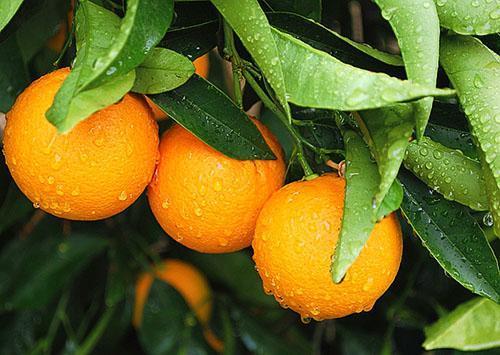Useful properties of an orange
 The original inhabitant of the subtropical zone and the tropics in Asia and Africa, the orange appeared in Europe just a few centuries ago and during this time has become one of the most popular fruits. Thanks to the thick peel that protects the juicy pulp and the beneficial properties of the orange during transportation and storage, the inhabitants of the most remote corners of even the most severe climates are now familiar with the bright exotic fruits. Oranges are consumed fresh, they are used to make juices, jams and candied fruits. Slices and zest are added to pastries, pastries, meat dishes and side dishes.
The original inhabitant of the subtropical zone and the tropics in Asia and Africa, the orange appeared in Europe just a few centuries ago and during this time has become one of the most popular fruits. Thanks to the thick peel that protects the juicy pulp and the beneficial properties of the orange during transportation and storage, the inhabitants of the most remote corners of even the most severe climates are now familiar with the bright exotic fruits. Oranges are consumed fresh, they are used to make juices, jams and candied fruits. Slices and zest are added to pastries, pastries, meat dishes and side dishes.
Sweet and sour fragrant orange slices are not only a delight in taste, but also a source of numerous beneficial substances.
What is useful orange, what in its composition attracts more and more people to the ranks of orange fruit fans?
The composition of nutrients in oranges

The pulp of this type of citrus:
- 87.5% moisture;
- 10.3% are carbohydrates;
- contains fiber - 1.4%;
- organic acids - 1.3%;
- proteins - 0.9%;
- pectins - 0.6%.
A long line of minerals that make up oranges includes potassium and calcium, phosphorus, magnesium and sodium, sulfur, chlorine, iron and zinc, boron, copper and manganese. The fruits contain almost two dozen valuable amino acids. In addition to vitamin C, which is one of the fruit's greatest virtues, oranges contain vitamins A and E, as well as B1, B2, B3, B5, B6 and B9.
What are the benefits of oranges?
Just one listing of vitamins and minerals makes us believe in the benefits of oranges for the human body.
 If we take into account that the harvest of fruits occurs during the cold period in Russia, then the importance and benefits of oranges in the diet can hardly be overestimated. When consumed regularly, fruits can be a good source of vigor and energy, they have a beneficial effect on the state of the circulatory and heart systems. As a result, the risk of atherosclerosis and hypertension, strokes and heart attacks is reduced. If the menu contains the fruits themselves, dishes with them or freshly squeezed juice, the benefits of oranges are felt pretty soon and is determined by the normalization of blood pressure, a surge of energy and better performance.
If we take into account that the harvest of fruits occurs during the cold period in Russia, then the importance and benefits of oranges in the diet can hardly be overestimated. When consumed regularly, fruits can be a good source of vigor and energy, they have a beneficial effect on the state of the circulatory and heart systems. As a result, the risk of atherosclerosis and hypertension, strokes and heart attacks is reduced. If the menu contains the fruits themselves, dishes with them or freshly squeezed juice, the benefits of oranges are felt pretty soon and is determined by the normalization of blood pressure, a surge of energy and better performance.
A moderate amount of juicy pulp rich in antioxidants and beta-carotene in the menu is a tasty and healthy way to prolong youth, protect tissues from negative environmental influences, mutations and even the development of cancer cells.
Vitamin C in orange pulp and juice actively enhances immunity, counteracts colds and seasonal viral diseases, infections of the oral cavity and respiratory organs.
Due to the high concentration of active substances, including phytoncides, the beneficial properties of oranges help to heal abscesses and wounds faster, prevent microbes and pathogenic flora from disrupting the body's natural defenses and harming health.
In conditions of vitamin deficiency, oranges serve as an excellent antiscorbutic agent, actively tone up, strengthen the human immune system and improve metabolism. Such beneficial properties of oranges are undoubtedly used in cases of suspected vitamin starvation, overwork and depression. The abundance of vitamins and minerals will also be beneficial for anemia.
 Oranges as an aperitif or as part of a dish help to improve appetite, stimulate bile production and stimulate digestion. Competent inclusion of citrus fruits in the menu normalizes metabolism. The pectins included in its composition promote digestion, increase the motility of the large intestine, suppress and eliminate putrefactive processes in the digestive system.
Oranges as an aperitif or as part of a dish help to improve appetite, stimulate bile production and stimulate digestion. Competent inclusion of citrus fruits in the menu normalizes metabolism. The pectins included in its composition promote digestion, increase the motility of the large intestine, suppress and eliminate putrefactive processes in the digestive system.
The acids in fruits can lower cholesterol levels and normalize fat metabolism in the body.
Moreover, oranges are extremely popular among those who want to lose weight. And here dietary fiber comes to the rescue, the fiber of which the fruit pulp filled with juice is composed. What are the benefits of orange pulp for the body? While in the digestive tract, orange pulp takes a long time to digest and creates a feeling of fullness. In this case, fiber serves as a natural sponge that collects and removes toxins from the body and formed in the digestive system.
 Red oranges, whose pulp, and sometimes the zest, is distinguished by a beautiful pink or crimson color, due to the presence of anthocyanins, can be used as a preventive agent in the fight against cancer, aging of the body and maintaining youth.
Red oranges, whose pulp, and sometimes the zest, is distinguished by a beautiful pink or crimson color, due to the presence of anthocyanins, can be used as a preventive agent in the fight against cancer, aging of the body and maintaining youth.
Orange peel: beneficial properties
 The hostesses are well aware that not only juicy slices, but also the zest can be used in culinary dishes. Doctors say that it is the orange peel that has even more beneficial properties than the pulp..
The hostesses are well aware that not only juicy slices, but also the zest can be used in culinary dishes. Doctors say that it is the orange peel that has even more beneficial properties than the pulp..
In addition to the vitamin set, a large amount of flavonoids is concentrated in the zest. It is the source of dietary fiber, calcium, essential oils and calcium most beneficial to the body.
The zest is rich in valuable acids and, in fact, are natural antibiotics phytoncides. Therefore, you should not throw away such a valuable product, but rather find a more worthy use for the zest. For example, orange peel can be consumed in your favorite foods or used as a topical remedy to lighten skin and fight inflammation.
Before eating, it is important to thoroughly rinse the layer of preservatives from the zest that was applied during picking to prolong the freshness of the fruit.
The benefits and harms of freshly squeezed orange juice
 Orange juice is a recognized source of vitality and vitamins. What is orange juice good for, and is everyone worth drinking?
Orange juice is a recognized source of vitality and vitamins. What is orange juice good for, and is everyone worth drinking?
Indeed, a glass of the drink, which is obtained from fresh fruits, can fully cover the body's need for vitamin C. It perfectly quenches thirst, tones up and protects against colds. Almost all nutrients pass from fruit to juice. Therefore, it is reasonable to expect that drinking the drink will improve digestion and strengthen immunity, help replenish the body's energy reserves and cope with microbes and disease-causing flora.
However, it is worth remembering that most of the fiber does not get into the juice, which means that you should not count on losing weight or cleaning the body after taking the drink.
More actively than whole fruits, juice acts on the mucous membranes, irritating them and provoking exacerbations of chronic diseases of the digestive tract and a number of other diseases. Therefore, before introducing a drink into your diet, you need to evaluate the possible benefits and harms of freshly squeezed orange juice, and it is better to consult with specialists.
Harm and contraindications
 As with other fruits with medicinal properties, the general rules of use apply to oranges: moderation and reasonableness.With the mass of useful properties of the orange, there are several categories of people who will have to give up this exotic fruit and juice from it. First of all, these are patients suffering from gastric ulcer and duodenal ulcer, gastritis and inflammation of the pancreas. Acids, which are abundant in oranges, irritate already inflamed and damaged tissues and can lead not to recovery, but to exacerbate diseases and deteriorate well-being.
As with other fruits with medicinal properties, the general rules of use apply to oranges: moderation and reasonableness.With the mass of useful properties of the orange, there are several categories of people who will have to give up this exotic fruit and juice from it. First of all, these are patients suffering from gastric ulcer and duodenal ulcer, gastritis and inflammation of the pancreas. Acids, which are abundant in oranges, irritate already inflamed and damaged tissues and can lead not to recovery, but to exacerbate diseases and deteriorate well-being.
Even with high acidity, an orange can cause nausea, heartburn, and other signs of gastrointestinal discomfort.
Acids also have a negative effect on tooth enamel. If citrus fruits are consumed without measure, the sensitivity of the enamel increases, it becomes thinner, and then caries may begin. Therefore, doctors advise you to clean or at least rinse your mouth after drinking a glass of juice or eating an orange. With great care, oranges should be included in the menu for those who are prone to diabetes or are already sick.
But if you have food allergies, especially in children, you should be especially careful. With a lot of benefits, oranges are among the most frequently detected allergens, therefore, children under 9-12 months of age and nursing mothers are not given this fruit at all. Pregnant women should abstain from orange juice and pulp, starting from 22 weeks.